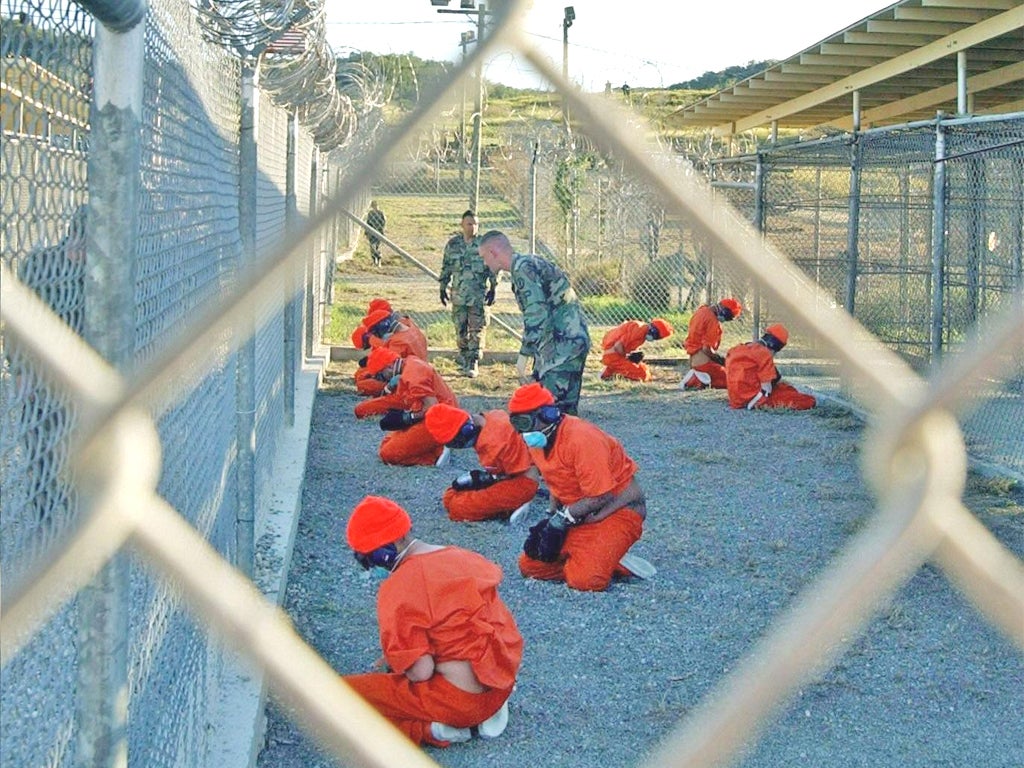Revealed: The 44 Guantanamo Bay inmates too dangerous to release
Freedom of Information request forces authorities to name terror suspects held for the last 12 years

Your support helps us to tell the story
From reproductive rights to climate change to Big Tech, The Independent is on the ground when the story is developing. Whether it's investigating the financials of Elon Musk's pro-Trump PAC or producing our latest documentary, 'The A Word', which shines a light on the American women fighting for reproductive rights, we know how important it is to parse out the facts from the messaging.
At such a critical moment in US history, we need reporters on the ground. Your donation allows us to keep sending journalists to speak to both sides of the story.
The Independent is trusted by Americans across the entire political spectrum. And unlike many other quality news outlets, we choose not to lock Americans out of our reporting and analysis with paywalls. We believe quality journalism should be available to everyone, paid for by those who can afford it.
Your support makes all the difference.The United States government has identified for the first time the several dozen inmates at the deeply troubled prison facility at Guantanamo Bay in Cuba whom it considers too dangerous to release but also too difficult to prosecute or ever put on trial.
The names of the men, who seem unlikely ever to regain their freedom, were released in response to a Freedom of Information request by the Miami Herald. There were 46 inmates originally put into the category of being 'beyond prosecution' by an inter-agency panel in 2010. Since then, two have died, one from a heart attack and another from suicide.
There are currently 166 prisoners still at the Guantanamo facility which was filled with terror suspects in the wake of the September 2001 terror attacks. What to do about them remains nearly twelve years later and has become a deeply awkward quandary for Washington. Matters now are being made still more difficult – and urgent – because of a hunger strike that continues to rage inside the prison walls. Currently 104 detainees are participating in the protest and 44 are being force-fed nutritional liquids through nose tubes.
In recent days President Barack Obama revived the pledge he first made upon taking office for the first time in early 2009 to close down the prison and the US State Department this week announced it has appointed a prominent Washington lawyer, Cliff Sloan, to accept the task of making it happen.
The UN's human rights chief Navi Pillay has previously called Washington's failure to close Guantanamo and release indefinitely held detainees a "clear breach of international law".
In a statement released earlier this year, she said: "We must be clear about this, the United States is in clear breach not just of its own commitments but also of international laws and standards that it is obliged to uphold."
But the options for the government and Mr Sloan are slim. Since Mr Obama first promised to shutter Guantanamo, the US Congress has placed a ban on bringing any of the inmates to the US to undergo trial in civilian courts. Meanwhile, there has been a reluctance to see inmates transferred back to their homelands to face trial.
The lists released this week also identify those inmates the US does intend to prosecute or is already prosecuting. They include Abu Zubaydah, who was subjected to water-boarding, as well as Mohammed al-Qahtani, a Saudi who allegedly would have been the 20th hijacker in the 9/11 attacks but for his being stopped at US customs.
Meanwhile the case of the last UK resident held in Guantanamo Bay was raised by the Prime Minister during talks with Mr Obama at the G8 Summit in Northern Ireland. Shaker Aamer, from London, has been in the military prison since 2002 following his detention in Afghanistan.
Foreign Office Minister Alistair Burt confirmed a discussion was held, adding that the government "continues to make clear to the US that we want Mr Aamer released".
In a separate development, Khalid Sheikh Mohammed, considered the mastermind of the 9/11 conspiracy, and his four co-defendants failed to show up on the second day of pre-trial hearings at the facility. The five men are charged with 3,000 counts of murder for planning and helping carry out the 9/11 attacks.
The list in full (with detainees' nationality)
-Abdul Haq Wasiq (Afghanistan)
-Mullah Norullah Noori (Afghanistan)
-Mullah Mohammed Fazl (Afghanistan)
-Uthman Abd al-Rahim Muhammad Uthman (Yemen)
-Moath Hamza Ahmed al-Alwi (Yemen)
-Mohammed al-Ansi (Yemen)
-Mahmud Abd Al Aziz Al Mujahid (Yemen)
-Abdel Malik Ahmed Abdel Wahab al Rahabi (Yemen)
-Majid Mahmud Abdu Ahmed (Yemen)
-Abd al Rahman Shalbi Isa Uwaydah (Saudi Arabia)
-Muhammed Rajab Sadiq Abu Ghanim (Yemen)
-Ali Ahmad al-Rahizi (Yemen)
-Ghaleb Nassar al Bihani (Yemen)
-Salem Ahmad Hadi Bin Kanad (Yemen)
-Mohammed Abd al Rahman al Shumrant (Saudi Arabia)
-Fawzi Khalid Abdullah Fahad al Odah (Kuwait)
-Saeed Ahmed Mohammed Abdullah Sarem Jarabh (Yemen)
-Khalid Ahmed Qasim (Yemen)
-Abdul Latif Nasir (Morocco)
-Mashur Abdullah Muqbil Ahmed al-Sabri (Yemen)
-Mustafa Abd al-Qawi Abd al-Aziz al-Shamiri (Yemen)
-Abdul Rahman Ahmed (Yemen)
-Salman Yahya Hassan Mohammad Rabei’i (Yemen)
-Yassim Qasim Mohammed Ismail Qasim (Yemen)
-Faez Mohammed Ahmed al-Kandari (Kuwait)
-Haji WaH Muhammed (Afghanistan)
-Zahar Omar Hamis bin Hamdoun (Yemen)
-Khairullah Said Wali Khairkhwa (Afghanistan)
-Omar Khalif Mohammed Abu Baker Mahjour Umar (Libya)
-Ismael Ali Faraj Ali Bakush (Libya)
-Mohammed al Zahrani (Saudi Arabia)
-Awal Gul (Afghanistan) (Deceased)
-Mohammad Nabi Omari (Afghanistan)
-Ayub Murshid Ali Salih (Yemen)
-Bashir Nasir Ali al-Marwalah (Yemen)
-Shawqi Awad Balzuhair (Yemen)
-Musab Omar Ali al-Mudwani (Yemen)
-Hail Aziz Ahmed al-Maythali (Yemen)
-Said Salih Said Nashir (Yemen)
-Karim Bostan (Afghanistan)
-Omar Mohammed Ali al-Rammah (Yemen)
-Mohammed Kamin (Afghanistan)
-Ahmid al Razak (Afghanistan)
-Abd al-Salam al-Hilah (Yemen)
-Guleed Hassan Ahmed (Somalia)
-Mohammed Abdul Malik Bajabu (Kenya)
-Inayatullah (Afghanistan) (Deceased)
-Muhammad Rahim (Afghanistan)
Join our commenting forum
Join thought-provoking conversations, follow other Independent readers and see their replies
Comments